Bet She'an is 30 km south of the Sea of Galilee. Its strategic location
where the Valley of Jezreel meets the Jordan Valley near Mount Gilboa was
where the main roads from Egypt to Damascus intersect making the town a
thriving commercial and cosmopolitan centre. Excavations show 20 layers of
occupation dating back to the Chalcolithic era (4th century BCE). Presence
of Egyptian temples and stelae suggest that this was also an Egyptian
administrative town. It was allocated to the tribe Manasseh who were unable
to drive out the local Canaanites (Joshua 17:12). Instead they settled among
them.
Bet She'an was where the bodies of Saul and his three sons were fastened to
the city wall after their death on Mount Gilboa (1 Samuel 31:10). Men from
Jabesh-Gilead took them down at night and gave them a decent burial.
Later Bet She'an was taken over by the Greeks and renamed Scythopolis which
became one of the cities of the Decapolis in Jesus' times. After the Greek
came the Romans who were great city builders. The present ruins were of that
of a walled city with the agora, temples, a theatre with a colonnated street
that were once lined with shops.
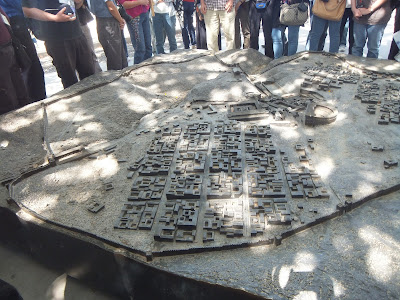 |
| detailed bronze
replica of Roman Bet She'an |
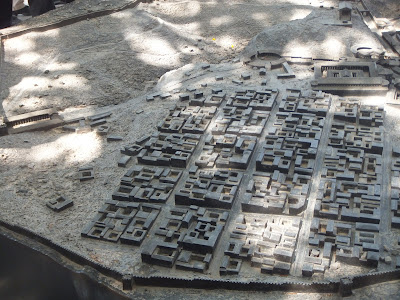 |
| a closer view
|
|
this hill was probably where the original Canaanite city stood |
|
|
|
|
|
This may be where the bodies of saul and his sons were hung and their bodies
were retrieved for burial by the men from Jabesh-Gilead.
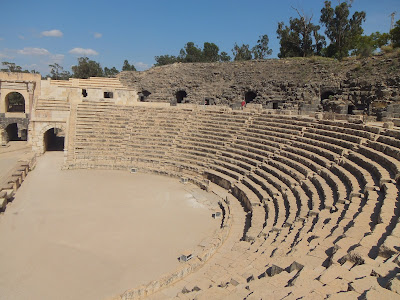 |
| the Roman theater |
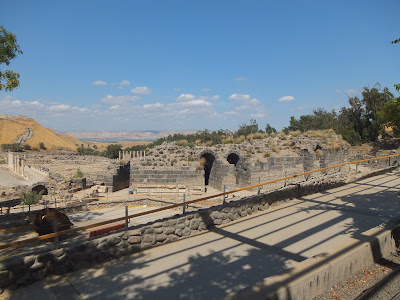 |
| the bath house |
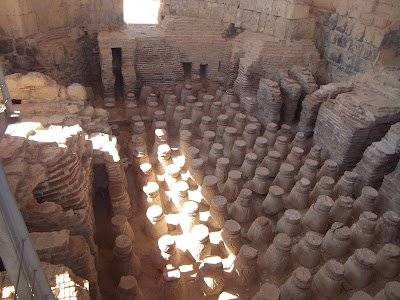 |
| pillars to hold
the floor and retain the heat for a sauna |
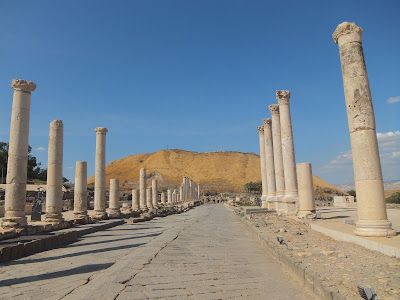 |
| colonnaded street
which may once be lined with shops |
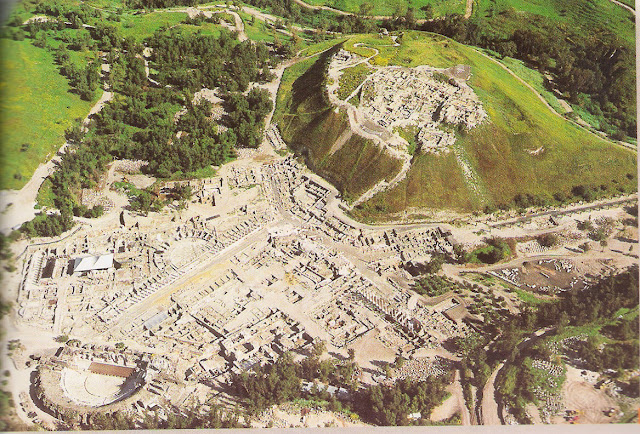 |
| aerial view of the
ruins in Bet Shean (source: The Holy Land) |
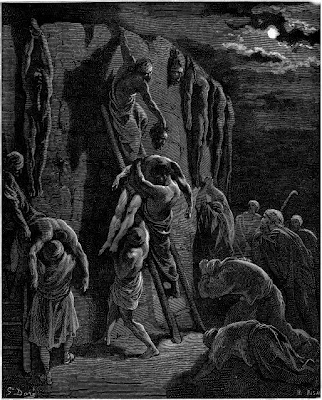
Every time I read the account of how the brave men of Jabesh-Gilead went by
night and climb the city walls to cut down the bodies of Saul and his sons,
I cannot help but wonder why would they do that? Infiltrating an enemy
fortified city is dangerous work and all these just to ensure four dead
bodies has a decent burial? I also wondered why any of King Saul's mighty
men did not attempt to salvage their king's honour?
An incident early in 1 Samuel 11 in Saul's life threw some light on the
events.
1 Nahash the Ammonite went up and besieged Jabesh Gilead. And all the men
of Jabesh said to him, "Make a treaty with us, and we will be subject to
you." 2 But Nahash the Ammonite replied, "I will make a treaty with you only
on the condition that I gouge out the right eye of every one of you and so
bring disgrace on all Israel." 3 The elders of Jabesh said to him, "Give us
seven days so we can send messengers throughout Israel; if no one comes to
rescue us, we will surrender to you." 4 When the messengers came to Gibeah
of Saul and reported these terms to the people, they all wept aloud. 5 Just
then Saul was returning from the fields, behind his oxen, and he asked,
"What is wrong with the people? Why are they weeping?" Then they repeated to
him what the men of Jabesh had said. 6 When Saul heard their words, the
Spirit of God came upon him in power, and he burned with anger. 7 He took a
pair of oxen, cut them into pieces, and sent the pieces by messengers
throughout Israel, proclaiming, "This is what will be done to the oxen of
anyone who does not follow Saul and Samuel." Then the terror of the LORD
fell on the people, and they turned out as one man. 8 When Saul mustered
them at Bezek, the men of Israel numbered three hundred thousand and the men
of Judah thirty thousand.
Saul and his men defeated the Ammonites and the men of Jabesh Gilead never
forgot this deed. I wonder how often we forget the good deeds other people
has done for us? We are very adept at remembering the bad 'things' that
others have done to us and we never let them or others forget. But we tend
to be forgetful of the good others have done us. Our memory are short when
it come to this. The men of Jabesh Gilead did not forget how Saul has saved
them from being one-eyed and they braved the dangers to repay the deed. May
we also never forget the good that others have done us, and by God's grace,
one day repay them.









